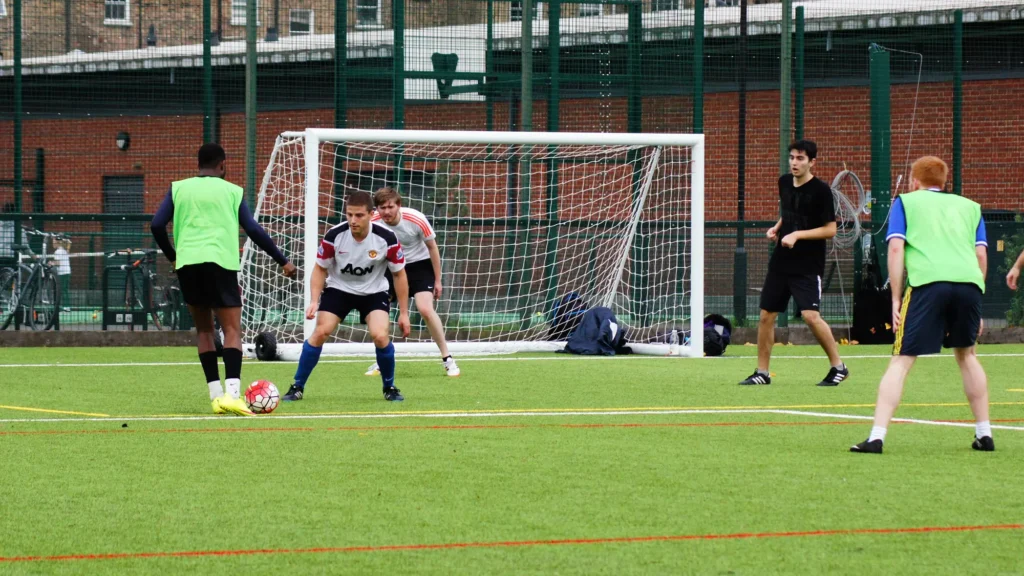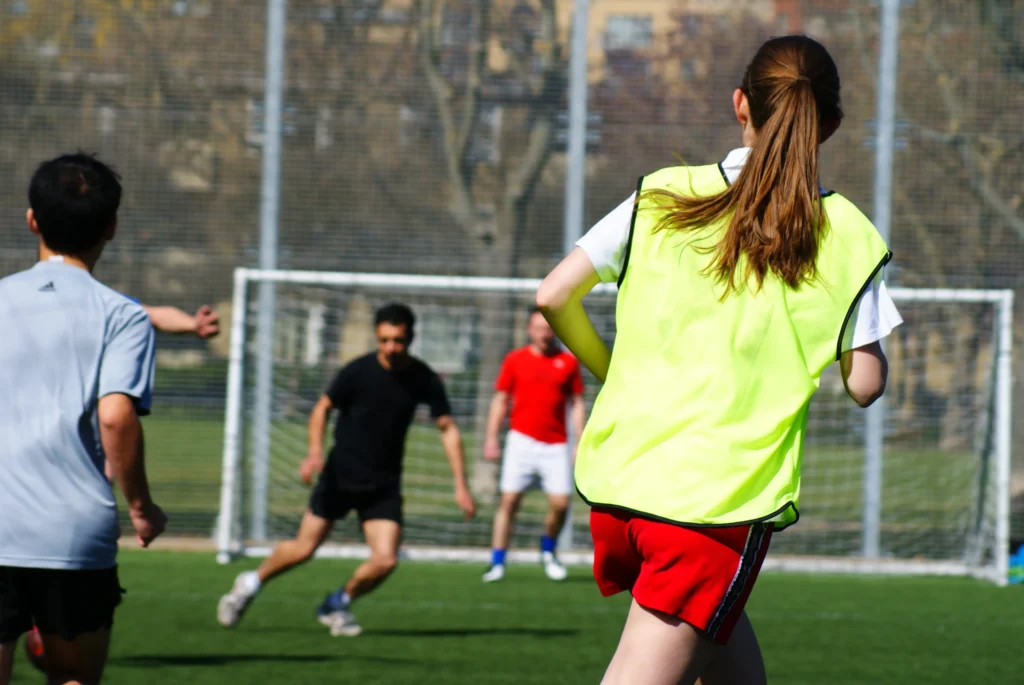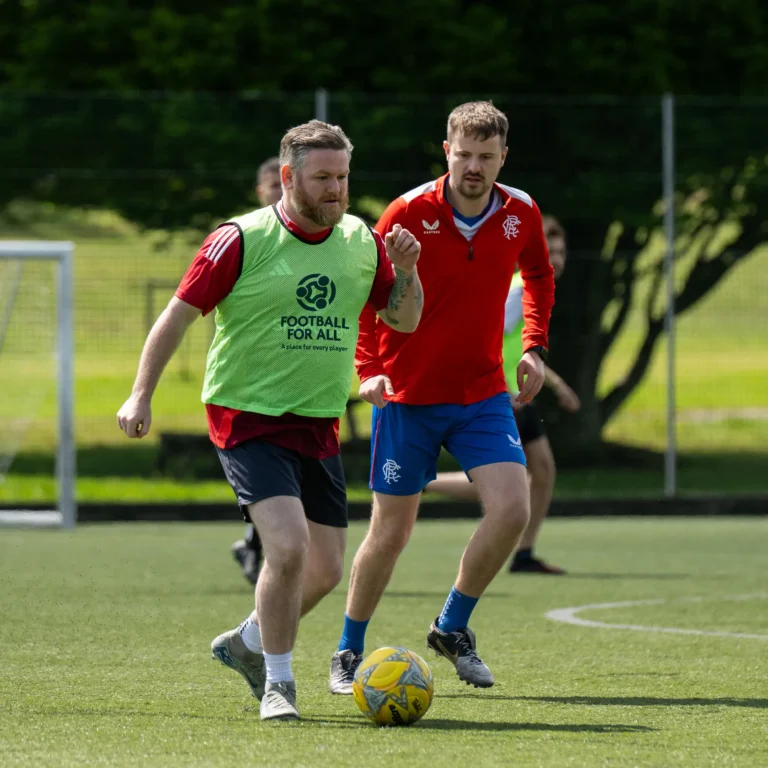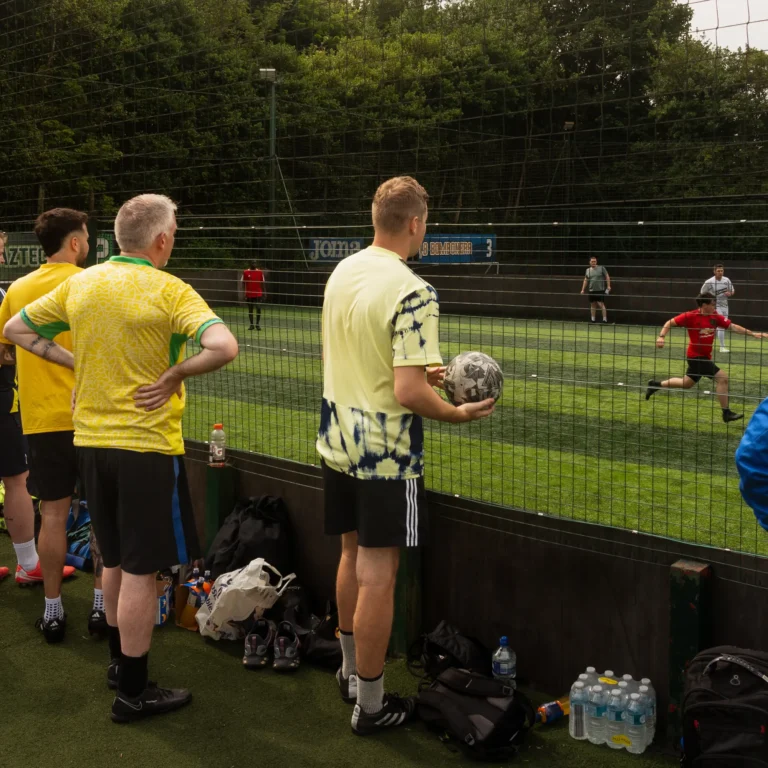Social Football by the numbers
Adult social football is now one of the most popular forms of sport. If you visit an astro pitch in almost any town in Britain on a weekday evening, you will see groups meeting for a game. For many, this weekly routine is the main way they stay fit and see friends. It creates a sense of belonging and brings people together who might never meet otherwise. The following 11 numbers show why these sessions matter, from how many people play to the impact on public health and the way they strengthen community life.
1. 63.7% of adults (30 million) are physically active weekly
Sport England’s latest Active Lives survey reports that 63.7% of UK adults meet the recommended 150 minutes of activity per week. That’s about 30 million people.This is the highest level on record. Social football on local astro pitches helps many in this count. Casual 5-a-side to 11-a-side games are an easy, fun way for busy adults to stay active. By offering a friendly environment (often mixed-gender and informal), local games help draw in people who might otherwise skip exercise. For Football for All and similar groups, every new player meeting the guidelines means better health and well-being for the community.
2. 1,088,600 fewer adults playing Football (2015–2023)
Despite general activity rising, football participation among adults has actually fallen. Data shows 1,088,600 fewer adults played football in England in 2023 compared to 2015/16. This drop (around 23%) shows why casual, accessible football is needed. Local astro-pitch sessions (which often run weeknights or weekends without fixed team commitments) are helping to reverse this trend by making it easy for anyone to join in at short notice. We see first-hand that offering more social games helps re-engage players who drifted away from formal clubs. Every year we add at least 20% more weekly games across UK towns and cities.
3. 15 million people play Football regularly in England
Across England, an estimated over 15 million people play football on a regular basis (grassroots and casual combined). That’s a huge base of adults getting exercise and social contact. It underlines how popular football really is and how many benefit from it each week. For example, social sessions run by Football for All make sure that whether someone is 18 or 80, experienced or a beginner, there’s a place for them. Each new astro-pitch session taps into that 15 million and even grows it, by giving more people a reason to turn up each week.

4. 80 hours of play per week on one 3G pitch (vs 6 on grass)
A single well-maintained artificial grass pitch can sustain up to 80 hours of play per week. By contrast, a natural grass pitch often can manage only around 6 hours safely before becoming worn. This 80 vs 6 difference means astro-turf can host dozens of sessions every day, summer or winter. For local communities, that translates to more games and more players. A town with several astro pitches can run three or four matches at once on one evening, with floodlights extending play late into the night. In short, 3G pitches multiply opportunities for people to play. A key number for councils that shows how important artificial turf is to meet demand.
5. 1,400 weekly games on 3G vs 100 on grass
Put another way, the extra availability means up to 1,400 playing opportunities per week on one 3G pitch. A single turf field can support about 1400 casual or league games a week, compared to just 100 on grass before it needs rest. This vast 1,400 vs 100 gap shows why communities with astro pitches have booming participation. People can book and play whenever they want without long waits or cancellations. For adults juggling work and family, it means more chances to get a game. Every time we open a new community session on an astro pitch, we unlock hundreds more playing slots per week, serving dozens more men and women who want to stay active together.
6. 120,000 football matches lost annually to bad weather
Cold weather, heavy rain or snow can put a football season on hold. The FA estimates that 120,000 community matches are lost each year in England due to adverse weather. That’s nearly 7 million minutes of football wiped out (see next stat). This loss affects casual players especially. A cancelled Saturday game might mean a player misses out entirely that week. By contrast, artificial pitches drain quickly and are often heated, so games can go ahead almost every week. If even half of those 120,000 matches were moved to well-equipped 3G pitches, thousands more players would get to play regularly.
Surveys find that 3 in 5 adults have at some point been prevented from taking part in sport due to extreme weather. In other words, 60% of us have had plans ruined by rain or snow. This is a wake-up call. Without better facilities, many people simply stop playing when the pitch is flooded or frozen. That’s another reason to organise kickabouts on astro pitches. We often hear from local players how relieved they are that “rain no longer means no football”. Every extra session in bad weather is captured by those 3 in 5.
7. £540m + £780m saved annually on NHS visits
Active people make the health system cheaper. Sport England reports that being active saves £540 million per year in reduced GP visits and £780 million in lower mental health service use. In total that’s £1.32 billion a year saved by keeping people fit and well. Social football on astro pitches is part of this. Each time someone turns up for their weekly game instead of sitting on the sofa, they improve their health. From our perspective, that’s money going back to the NHS. Every heart check-up or therapy session not needed is partly thanks to playing sports. It’s a compelling number for councils and funders. Supporting local games actually saves public money.
8. £15.9 billion annual value of Grassroots Football
When you include all grassroots football (kids and adults), the total value is enormous. The Football Foundation estimates social football contributes £15.9 billion to society each year. This number includes the economic, health and social benefits of people playing regularly. It covers everything from gym-free exercise, to the jobs supported by venues, to the crime reduction below. For context, that’s roughly the GDP of a small country. Even though grassroots is broader than just astro-pitch adult games, it shows the scale of football’s impact. Social football on astro pitches is central to the whole system. Every extra session on these pitches adds value to the game and feeds into the £15.9 billion that football brings to society each year.
9. 500,000 cases of disease prevented each year
Social football helps prevent illness on a massive scale. According to studies tied to grassroots investment, 500,000 cases of disease are prevented every year through people playing football. This includes conditions like heart disease, diabetes and depression. We often hear that people use our community games as part of managing their fitness or mental health. When one person joins a session and stays active instead of becoming sedentary, they count toward preventing these diseases. The huge “half a million” figure shows how much football matters for public health. Local astro sessions are literally helping keep half a million people out of doctors’ offices each year.
10. 13,000 crimes prevented annually by Football
Sports can also make neighbourhoods safer. The same reports estimate about 13,000 crimes are averted each year thanks to grassroots football. The logic is clear. People who might otherwise be idle are busy on the pitch, building friendships and community bonds instead of trouble. Local games give young people especially a positive outlet after school and at weekends. In practice, we’ve seen this effect. Towns with a strong social football scene often report better youth engagement. This crime-prevention stat is another way to understand football’s social value. By investing in local astro pitches, councils get both healthier people and safer streets.
11. 1.5× more effective than medicine for depression
Finally, football is also great for mental health. A major review found that exercise (like playing football) was 1.5 times more effective than antidepressant medication or therapy for easing mild-to-moderate depression. In other words, a weekly game can lift mood even better than a pill or a session on the sofa talking it out. The team aspect of football adds extra benefit. Camaraderie, laughter and friendly rivalry. We hear again and again that players feel happier after each session. Numbers like “1.5 times more effective” make a strong case that local games are great for mental health. Every community pitch can be seen as a free clinic for well-being.

Be part of the future of Social Football
For us at Football for All, every statistic confirms what we see on the pitch. Players tell us that the weekly game is the highlight of their week, a place to make friends, stay fit and feel connected.
If you’re inspired by these figures, why not get involved? Join a local game or get in touch to support our mission to bring social football to every town in the UK. Together, we can keep these numbers moving in the right direction.
Sources: Health, participation and growth figures are drawn from FA and Sport England reports, as well as publicly available NHS data. Social impact and investment returns are from Sport England and FA analyses.


